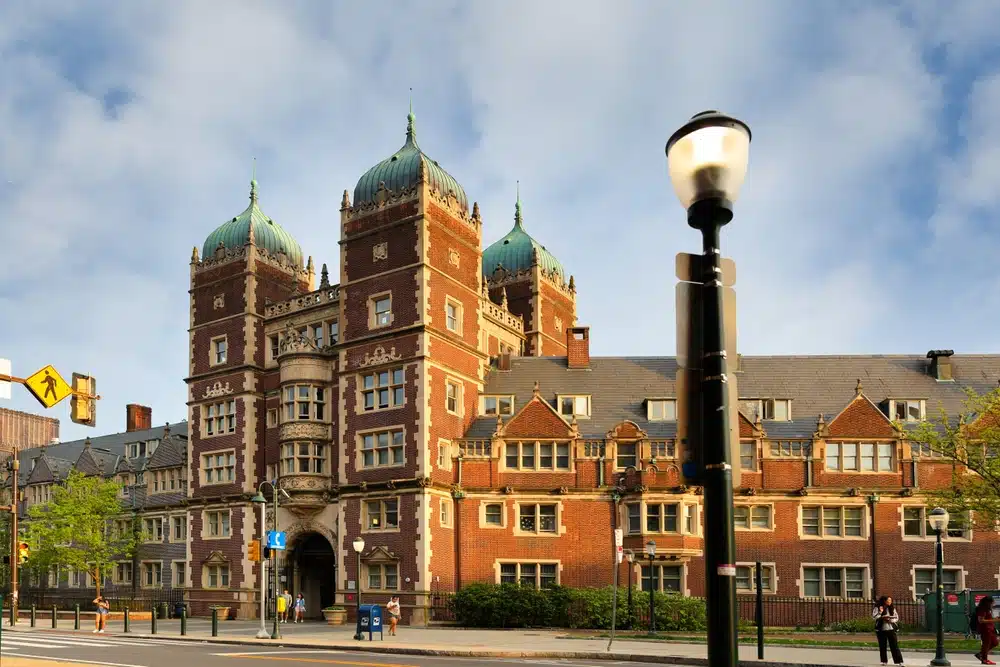Who Is the Founder of UPenn? A Look at the University’s History
The University of Pennsylvania, also known as UPenn, is widely recognized as one of the world’s most prestigious institutions of higher learning. The history of UPenn is steeped in tradition, innovation, and forward-thinking principles, but the story of this illustrious university cannot be told without a keen focus on its remarkable founding and development.
Understanding the Founding of UPenn
UPenn’s establishment dates back to 1740, an era when the concept of higher education was still in its infancy in the North American colonies. With only a handful of institutions in existence, and most of them dedicated solely to producing ministers, there was a pressing need for a broader and more practical scope of education.
The Man Behind the University: Benjamin Franklin
To illuminate the story of UPenn’s founding, one must first learn about Benjamin Franklin, a pioneering figure in America’s formation and the mind behind UPenn’s inception. Franklin, driven by an enlightened vision for universal education, played a pivotal role in shaping the university and its objectives. A man of diverse interests and talents, his input significantly influenced the university’s curriculum, steering it away from classical education and towards practical courses that have real-world applications.
The Initial Vision for UPenn
Franklin’s vision for UPenn was founded on the premise of providing an education that was useful and impactful. In his words, the idea wasn’t to produce mere men of letters, but men of action. This concept was revolutionary at the time and took root in what is widely acknowledged as Franklin’s “bold and innovative proposal,” ultimately culminating in the inception of UPenn.
Tracing the University’s Evolution
Like any venerable institution, UPenn has experienced significant evolution throughout the centuries, continually adapting to the demands of each new era while maintaining its commitment to Franklin’s founding principles of practical and applicable learning.
As we delve deeper into the rich history of UPenn, we uncover a tapestry of growth, innovation, and academic excellence that has shaped the university into what it is today.
UPenn in the 18th and 19th Centuries
Between the 18th and 19th centuries, UPenn remained at the forefront of liberal education in America, expanding its programs to encompass the sciences, classics, and the arts. It stood out as a pioneer in fields like medicine, law, and engineering, becoming the first university in America to confer degrees in these areas.
During this period, UPenn’s campus buzzed with intellectual fervor as students and faculty engaged in lively debates and groundbreaking research. The university’s commitment to fostering a vibrant intellectual community attracted some of the brightest minds of the time, who went on to make significant contributions to their respective fields.
The University’s Growth in the 20th Century
At the turn of the 20th century, UPenn continued its upward trajectory toward academic excellence. Under several visionary presidents, the university began developing a comprehensive campus and solidifying its leading-edge position in research and innovation.
During this era, UPenn uniquely positioned itself as a valuable contributor to tackling societal and global challenges. Faculty and students collaborated on groundbreaking research projects that addressed pressing issues such as public health, urban planning, and social justice. The university’s commitment to making a positive impact on the world became a defining characteristic of its identity.
UPenn in the Modern Era
Today, UPenn stands as a global leader in higher education, renowned for its diversity, innovation, and impact. The university carries on Franklin’s legacy, empowering future leaders through a blend of rigorous curriculum and practical application in a multitude of fields.
UPenn’s modern campus is a testament to its commitment to providing state-of-the-art facilities and resources for its students and faculty. From cutting-edge research labs to collaborative spaces designed to foster interdisciplinary collaboration, the university ensures that its community has the tools they need to push the boundaries of knowledge.
Furthermore, UPenn’s dedication to diversity and inclusion has created a vibrant and dynamic learning environment where students from all walks of life come together to learn, grow, and challenge each other’s perspectives. The university actively promotes a culture of inclusivity and encourages its students to embrace their unique identities and experiences.
As UPenn continues to evolve, it remains steadfast in its mission to shape the leaders of tomorrow, equipping them with the knowledge, skills, and values necessary to make a positive impact on the world. The university’s commitment to excellence, innovation, and social responsibility ensures that it will continue to be a beacon of intellectual progress for generations to come.
The Impact of UPenn’s Founding Principles
UPenn’s founding principles have profoundly shaped its cultural and academic fabric and continue to do so even in the present day.
Founded in 1740, the University of Pennsylvania, also known as UPenn, has a rich history that is deeply intertwined with its founding principles. These principles, established by its founder Benjamin Franklin, have not only laid the foundation for the university but have also influenced its growth and development over the centuries.
The Influence of Benjamin Franklin’s Ideals
Benjamin Franklin, one of the Founding Fathers of the United States, had a vision for education that went beyond traditional academic pursuits. His ideals of a university being not just a hub for intellectual development but also a place for cultivating practical skills remain a cornerstone at UPenn.
Franklin believed in the power of education to transform individuals and society as a whole. He envisioned a university that would equip students with the knowledge and skills necessary to make a meaningful impact in the world. This vision is reflected in UPenn’s commitment to interdisciplinary learning and its emphasis on the practical application of knowledge.
Franklin’s legacy can be seen in the university’s diverse range of programs and initiatives. From its renowned Wharton School of Business to its prestigious School of Engineering and Applied Science, UPenn offers a comprehensive education that combines academic rigor with real-world relevance.
How UPenn’s Founding Principles Shape Its Present
UPenn’s commitment to the fusion of theory and practice, as articulated by Franklin centuries ago, remains central to its modern academic vision. The university continues to uphold and build upon its founding principles, ensuring that students receive an education that prepares them for the challenges of the 21st century.
One of the ways in which UPenn embodies Franklin’s ideals is through its cutting-edge research. The university is home to numerous research centers and institutes that tackle some of the world’s most pressing issues. Whether it’s finding innovative solutions to climate change, developing breakthrough medical treatments, or exploring the frontiers of artificial intelligence, UPenn’s research endeavors are driven by a commitment to making a positive impact on society.
In addition to its research efforts, UPenn places a strong emphasis on experiential learning. The university offers a wide range of opportunities for students to apply their knowledge in real-world settings. From internships and co-op programs to community service initiatives, UPenn students are encouraged to engage with the world outside the classroom and make a difference in their communities.
UPenn’s commitment to service is deeply rooted in its founding principles. Franklin believed in the importance of using education for the betterment of society, and this ethos is reflected in the university’s emphasis on civic engagement and social responsibility. UPenn students are encouraged to become active citizens and leaders who are dedicated to addressing the challenges facing their communities and the world at large.
In conclusion, UPenn’s founding principles continue to shape the university’s identity and guide its mission. From its interdisciplinary approach to education to its commitment to research and service, UPenn remains true to the vision of Benjamin Franklin, creating a community of scholars and leaders who are prepared to make a lasting impact on the world.
The Legacy of UPenn’s Founder
The legacy of Benjamin Franklin is etched in the identity of UPenn. His spirit of curiosity, discovery, and pragmatism continues to inspire the university.
Benjamin Franklin, a polymath and one of the Founding Fathers of the United States, left an indelible mark on the University of Pennsylvania. His multifaceted contributions to society, ranging from science and literature to politics and philanthropy, have shaped the institution into what it is today.
Franklin’s vision for UPenn was rooted in his belief in the transformative power of education. He understood that knowledge and learning were essential for personal growth and societal progress. This belief is reflected in the university’s commitment to providing a comprehensive and rigorous education that prepares students to tackle the challenges of the world.
Benjamin Franklin’s Lasting Impact on UPenn
Whether it’s his influence on the curriculum or his imprints on the numerous schools within the university, Franklin’s vision and ideals continue to steer UPenn. The university stands as a testament to his belief in the power of education to transform lives and improve the world.
Franklin’s influence on the UPenn curriculum can be seen in the emphasis on interdisciplinary studies. He believed that knowledge should not be confined to one specific field but should be explored across various disciplines. This philosophy is evident in the diverse range of academic programs offered at the university, encouraging students to pursue their passions while gaining a well-rounded education.
Furthermore, Franklin’s commitment to practical education is reflected in the university’s emphasis on experiential learning. UPenn provides students with opportunities to engage in internships, research projects, and community service, allowing them to apply their knowledge in real-world settings. This hands-on approach to learning aligns with Franklin’s belief in the importance of practical skills and their application in society.
Honoring the Founder: Monuments and Tributes at UPenn
Franklin’s impact on UPenn is commemorated through various tributes across the campus. The Benjamin Franklin statue, located at the heart of the university, serves as a constant reminder of his contributions. The statue depicts Franklin in a thoughtful pose, symbolizing his intellectual prowess and innovative thinking.
In addition to the statue, the campus is adorned with various Franklin-inspired artworks and plaques. These artistic representations celebrate his achievements and serve as a source of inspiration for the university community. The artworks not only add aesthetic value but also provide opportunities for reflection and contemplation.
One of the most iconic tributes to Franklin at UPenn is the Franklin Field. This historic stadium, named in his honor, has witnessed countless athletic events and serves as a gathering place for the university community. Franklin Field stands as a testament to the enduring legacy of Benjamin Franklin and his commitment to fostering a sense of community and camaraderie.
Overall, the legacy of Benjamin Franklin permeates every aspect of UPenn. From the curriculum to the campus landmarks, his vision and ideals continue to shape the university’s identity. UPenn remains dedicated to upholding Franklin’s legacy by nurturing intellectual curiosity, promoting interdisciplinary collaboration, and preparing students to make a positive impact on the world, just as its founder envisioned.
Conclusion: Reflecting on UPenn’s Rich History
UPenn’s history is not just a series of events, but a journey of ideas, growth, and transformation that has created an enduring legacy.
The Significance of Understanding UPenn’s Origins
Unraveling UPenn’s origins provides a wealth of understanding about the university’s values, ethos, and commitment to making a significant societal impact. Understanding its founding illuminates the powerful influence Franklin’s principles continue to exert on the shaping of this globally recognized institution.
The Continuing Relevance of Benjamin Franklin’s Vision
Even centuries after his time, Benjamin Franklin’s vision for a practical and impactful education remains relevant. It continues to guide UPenn as it equips its students with the knowledge and skills they need to contribute meaningfully to the world, reaffirming the enduring relevance and power of its founding principles.









































